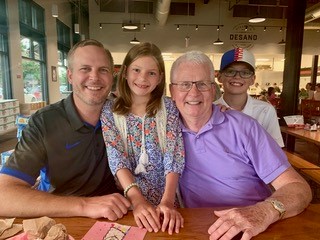Johns Hopkins UniversityEst. 1876
America’s First Research University
Retired U.S. Army Lt. Col. Barry Berglund of Greensboro, N.C., knows what it means to lead. As a leadership development professional for more than 30 years, Berglund quickly recognized that his physician, Ken Pienta, director of research at The Brady Urological Institute at Johns Hopkins, is a model leader who gets the best from his colleagues and his patients. Since 2017, Pienta has been there to support Berglund, helping his patient and friend work through Stage 4 metastatic prostate cancer. And Berglund is there to support Pienta as he pursues research discoveries that may well lead to a cure for prostate cancer.
Berglund spoke with Johns Hopkins Giving about why it’s important for him to marshal all his resources — including a generous commitment from his estate — to support Pienta’s work.
In the military, we call it an operations order. Whatever resources I have, I want to be a part of the solution. You only get one shot at this life, and I want to put up a good fight and know I’ve left something behind. Dr. Pienta is a great leader and physician — you can’t fail to feel his infectious energy and commitment. Plus, his research is very promising, helping to show why cancer cells are resistant and to develop a therapy to kill them. My goal is to be one of Dr. Pienta’s patients who helped kill this miserable disease off. Maybe the cancer research wasn’t there in time for the loved ones I’ve lost, and maybe it won’t be finished while I’m still around. At least I’ll know I’ve done something that may spare those who follow. Not a bad legacy.

I made the bequest in honor of my parents, brother, and wife who all bravely fought but ultimately lost their battles with various forms of cancer. Except for my older sister, I lost my first family to cancer, and I don’t think that’s a unique story. In addition to my son and his family, my Hopkins family is a vital part of my expanded support network. Just the word “chemo” is chilling. But everyone I’ve encountered at Hopkins — from the folks in the parking garage and at check-in to the nursing staff and those who did my infusions — I’ve found to be universally committed and caring.
In the spring, I completed the two-year clinical trial, involving tests, chemo, radiation, and hormone deprivation therapy. Granted, this stuff takes its toll. But life goes go on. For the past 15 years, I have been doing leadership programs for a few agencies within the Department of Defense, and now I always manage to work into my schedule a little prostate health outreach. I’ve helped as a kind of cancer coach for patients interested in Dr. Pienta’s clinical trial, as well as those I’ve met through the ZERO Prostate Cancer organization. It’s a good feeling to help newly-diagnosed guys, who have as many questions as I did, and I have several initiatives planned for 2020.
I asked Dr. Pienta how long he’d be following me, post clinical trial. His answer was quite succinct: “For the rest of your life!” I’ve had a PSA [prostate-specific antigen] screening every 90 days since I was diagnosed, and, happily, my PSA levels have been basically undetectable. Johns Hopkins and my local cancer center have worked together seamlessly, all for my well-being. For me and my family, it’s always been important not to let the disease rule our lives — and to do things we might not have done before the cancer. For instance, in December 2019, I’ll hit my 75th birthday. I’m flying some loved ones to Paris to help me celebrate with a gala meal at a Michelin three-star restaurant. You hear about “living each day,” and I wholly subscribe to that.
Interested in supporting research at the Johns Hopkins Brady Urological Institute?
Topics: Alumni, Faculty and Staff, Friends of Johns Hopkins Medicine, Johns Hopkins Medicine, Fuel Discovery